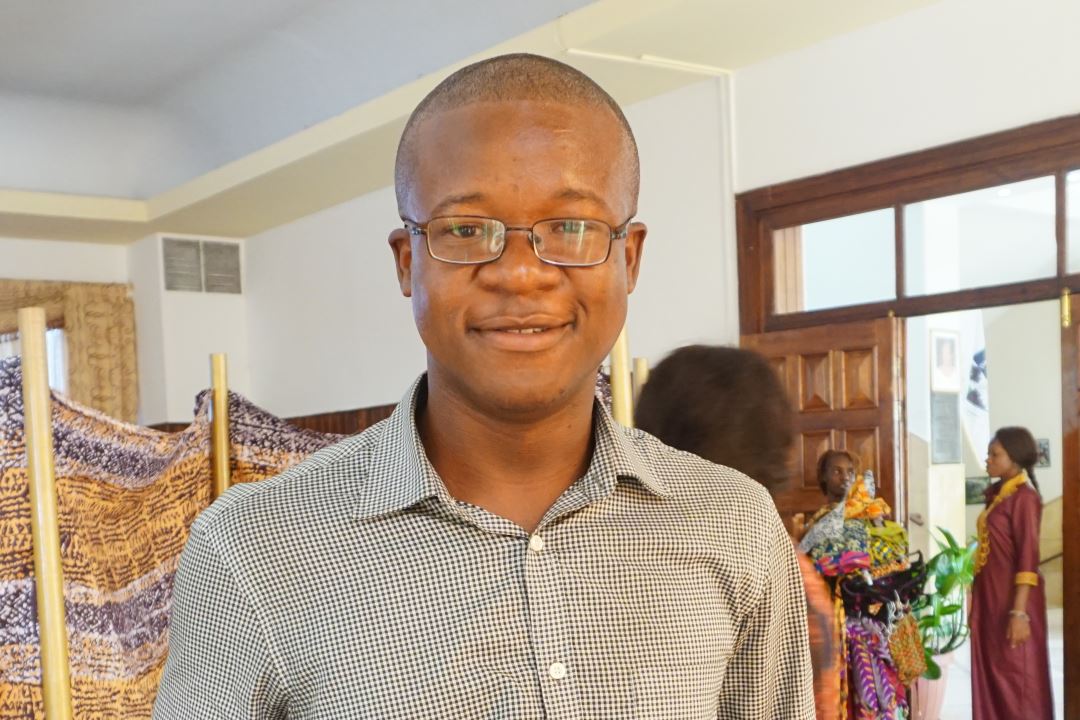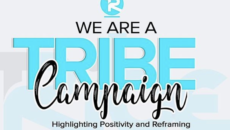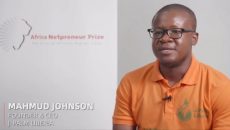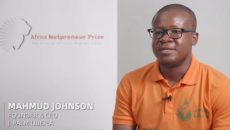The “Liberian Trailblazers” series profiles exceptional Liberians and the work they do. Recently, we caught up with Mahmud Johnson, the CEO of J-Palm, which recently launched its Kernel Fresh line of natural palm kernel oil.
Johnson headlined last week’s Micro, Medium, and Small Enterprises Conference hosted by the Ministry of Commerce as the keynote speaker.
During our interview with Johnson, we asked how he got his product from the conception stage to distribution in local supermarkets. In a previous article, we discussed the dearth of Liberian products on the shelves of local supermarkets, including a quote from President Ellen Johnson Sirleaf suggesting that supermarkets were not accepting Liberian-made products on their shelves.
What exactly does J-Palm do?
We’re an oil palm-based consumer goods and clean energy company. We create consumer products, and now we’re moving to using part of the palm fruit to also create clean energy products because there are also applications we can develop in that space.
Up until now, we had been selling directly to other businesses, including selling palm kernel oil to soap manufacturers and palm oil to retailers in urban markets.
We also supply the palm kernel cake – the residual product from palm kernel oil processing – to pig farmers as animal feed. Recently we got an order to export the palm kernel shells to Portugal to be used as biomass for renewable energy. Now we have created Kernel Fresh, which is our first mass market consumer product.
Why are you now targeting the average consumer?
One of our goals as a company is to be able to create products that are specifically designed for Liberians and Africans in general. Most of the cosmetic products that we have in this country were designed for people who don’t have the same skin texture or tone that we have. So we made it our mission to create products specifically targeting Liberians of the middle and low-income segment.
Is there any financial incentive to targeting consumers directly?
The margins are better if you market directly to consumers but there’s also a scale issue. You have to sell a certain number of units for you to realize those gains. It’s easier to sell directly to businesses where you don’t have to worry about bottling, labeling, or marketing the product.
Can you walk us through the steps of how you decided to go with this particular product and how you got it to the current stage?
I used palm kernel oil when I was growing up – on my skin and my hair. In fact, everybody in my household used it. It was the kind that was burnt and dark, but it worked pretty well for us in terms of enhancing the skin tone and fighting skin diseases like pimples and acne.
We had been involved in the palm oil business for some time along with other businesses. Recently, we started thinking about how we can move beyond this? How can we create value?
If you think about economic development in Liberia, small businesses are how we can create jobs – that’s how we can be able to pay more to the people we buy the palm kernels from.
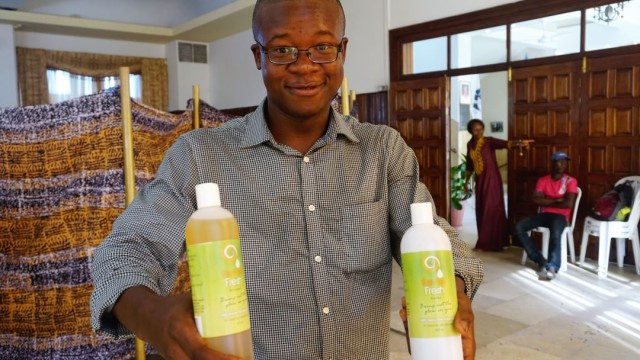
Johnson poses with his product. Photo: Jefferson Krua
Although we had this vision for branching into consumer products, the development of Kernel Fresh was a spontaneous thought. I was literally just driving, and this idea popped into my head – “palm kernel oil for the skin.” So I took some of the oil we manufacture and started using it on my skin personally. I’m a really careful person, and I didn’t want to give something to people that wouldn’t work or to make false statements. I’m the kind of person who suffers from pimples – I still do to this day. What I noticed was when I used the palm kernel oil, I had fewer and fewer breakouts than when I didn’t use the oil.
In fact, I had an interesting experience recently when I was in the United States. I had been using the palm kernel oil for about two months and then when I got to the States and was going through security at the airport, they took the oil from me. When I got to my final destination, I didn’t have anything to put on my skin, so I got regular cocoa butter lotion.
Just from using that for one week, I started to have breakouts again, I think you can see the marks on my face. It was only when I returned to Liberia and started using the oil again that my skin cleared. For me it’s effective – it helps even out my skin tone and remove all the pimples.
My mom has also been using it. She uses it in her hair. I don’t know if I should share this but prior to using the product, she didn’t have hair at the front of her head, and now that she’s started using it, the hair is growing back.
I started doing research on the oil and what I found out from the research is that palm kernel oil is loaded with antioxidants, vitamin E, and it’s also antibacterial, so palm kernel is a healing oil. The role of it is to return the skin to its natural condition. And for most of the people who have been using it, that’s what we’ve been seeing – whether it was evening out the skin tone or removing pimples, they talk about how it helps them return the skin to a healthy state.
Of course, there are people who just like the natural palm kernel oil with nothing added to it. We have a product that’s a natural oil and another with a coconut fragrance added to it. It actually smells very nice, a generic smell that anybody can use, male or female.
How did you make the decisions about how to package this product?
The thing about it is we don’t really have a robust packaging industry in Liberia. What that means is you actually have to travel to Accra, Lagos or Abidjan to get product packaging. I looked online and did my research, and I already had an idea of what I wanted – a clear bottle with a top that had a tube in it so you can press it to get the oil out.
When I arrived in Accra, I was told by the packaging manufacturer that the containers I wanted were out of stock and the production would be done in two weeks. My flight was supposed to leave in three or four days, so I just couldn’t wait.
When I got to another factory that does bottles, what we ended up with is what I got there. We decided to just get this bottle, put it out there, and see what the response is. Next time, we’ll do our research and get things right.
There are plastics manufacturers in Liberia. Why couldn’t you use a local manufacturer?
Yes, there are plastic manufacturing companies here but they’re saying that they can’t accommodate the volume which small businesses in Liberia order. I know so many other small business owners who have to travel to Ghana and other places for packaging. Most of the people I know, if they’re going to a conference or other events in Ghana, they just use that opportunity to buy the products while they’re there.
What about the package label?
The label was designed in Liberia by Charles Cooper. He did the design, and we printed the labels in the US. We attempted to print it here, but the costs were too high, and I was going to a conference in the US, so I just decided to print it there. It’s the first batch, so we’re just putting it out to see what the response is.
The label came with the adhesive on it, so we had to manually place it on ourselves. Yesterday, I was in my apartment doing this. This is a new product line so we still have to construct space in the factory for packaging. We have a factory for palm kernel oil processing, not for packaging these products.
How many units did you produce for the first batch?
We produced 1,900 bottles. Based on the consumer response, we’ll plan for the next batch. The response has been good so far. Each time I meet somebody, they buy a few bottles. I think that has to do with the fact that palm kernel oil is something everybody knows about in Liberia, but the form in which it is now being produced is different, so everyone is curious about trying it out.
How many people do you think are buying it to support Mahmud versus actually wanting the product?
We do meet some people who don’t know me and they still want to buy it. While I was talking to a manager of a supermarket for potential distribution, a cashier standing nearby asked about it and said she wanted to buy it. When I took the product to supply them, she came out and bought it from me. She said she uses palm kernel oil all the time, but this one is better packaged.
There are people in Liberia who, even to this day, still use palm kernel oil and for them, this is an upgrade. I don’t know what the numbers are regarding the market size but most of the people we’ve interacted with person-to-person buy it. The in-store sales are not that great yet; I guess because of packaging issues and people not really knowing where they can find it. But just the four or five times I’ve gone out to talk about it, we’ve sold 100 bottles from those interactions. So what we plan to do now is to get sales agents and people in beauty salons to sell our product.
Is it in any specialty stores?
No, it’s mostly in supermarkets for now – so places like Exclusive and Stop & Shop. We’re trying to get someone in charge of marketing, so once that person comes on board, they’ll be responsible for all that stuff. Honestly, this is a very small part of our business. It has the potential to be big but right now it’s a very small part and we have a lot of other things to be focusing on.
How did you get the product into the stores?
That has been an interesting experience. We literally just put the products in the car and drove to various supermarkets. We told them we had a product, showed them what it does and the packaging. Many of them looked at it, smelled it, and decided on the spot.
The way it works after that is you tell them the price and the suggested margin but of course, they’ll put their own price on it. We suggest 20% for our retailers but in some places it’s more than that.
The way the Liberian economy is structured, most of the retail stores are owned by foreigners. Most of them don’t even understand how special palm kernel oil is in Liberia, so it’s very difficult to explain what it is.
Few people have said, “It’s made in Liberia, so we’ll put it on our shelves.†Others have said they didn’t need this right now. “Come back next week. Come back next month.†We’re in five stores right now, out of the 12 stores we reached out to, but there’s a lot more that we could be in.
Given that this is a new product, it lends itself more to direct sales. Once we have a stable user base, then we can have it in the supermarkets where people can look for it themselves. The biggest challenge is just to get people to try the product.

J-Palm’s scented and unscented varieties of its Kernel Fresh line on a local supermarket shelf. Photo: Jefferson Krua
Do you think there are a lot of Liberian entrepreneurs trying to get their products into supermarkets?
There’s not a strong packaging industry in Liberia. Most people have challenges just packaging their products. You go to the supermarket and you’ll see pepper in a mayonnaise jar. Packaging is a major issue.
For a long time, we’ve been dependent on imports so even marketing “Made in Liberia†products is a bit of a challenge because people will associate “Made in Liberia†with a certain quality that’s below international brand standards. It is an educational challenge to get people to change their mindset about that.
Generally, there just aren’t a lot of manufacturers in Liberia.
Where do you see J-Palm in five years?
I would like to see J-Palm producing a full range of consumer products. If you think about companies like Unilever and Proctor & Gamble, they all started with the same palm oil. Most of the big companies use palm oil and palm kernel oil in their products.
We always talk about economic development in Liberia but how do we achieve that? If you buy something that’s made in China, for example, maybe a few dollars will go towards taxes. Maybe a few dollars will go to pay people who work in the shop.
But if you buy something made locally like Kernel Fresh, somebody in Nimba or Bong County will benefit. Instead of wasting the palm kernel, they’re now stockpiling and selling it. Maybe they’ll earn L$700-800 for one bag of palm kernels.
You also have somebody who’s paid to transport the product to the factory. You have someone who’s there to work in the factory to make the palm kernel oil. You have somebody to put it in the bottle and label it. We supply it to stores, and people are earning a margin on that. You have marketing, salespeople and advertising on the radio. So there’s a whole supply chain around it, and many more people are being impacted. Plus, we pay taxes.
From an economic development standpoint, there’s a much stronger case for supporting local businesses than for just going for whatever cheap products you see coming from abroad.
You don’t grow any of the palm kernels you use?
We source 100% of our palm products from smallholders. J-Palm exists in the first place to address this social problem of waste. A few years ago, people used to discard all the palm kernels after making the palm oil. On the other hand, there was a very strong demand for palm kernel oil, so much so that you had soap manufacturers paying people to go to Guinea and Sierra Leone to buy palm kernel oil.
So we were trying to connect those two markets where you eliminate waste by providing income for smallholders for a product that was really a waste product a few years ago. As a product that we can supply to soap manufacturers, they don’t have to go out of the country to purchase. They can just buy it right here. And if you’re traveling to Guinea to buy oil, you won’t just buy one gallon. You have to buy a lot, and you may need to borrow money for that. It’s too risky and stressful.
You received $100,000 grant from the 40 Chances Fellowship. How is that related to the business?
The award is provided to businesses whose model addresses issues of poverty and hunger. It’s almost like an investment except you don’t have to pay it back. What that has allowed us to do is to expand our operations, get better machines, expand our factory space, and get trucks to transport the palm kernels. You have to go to the most rural of areas to get the kernel and you can’t transport with small trucks.
The grant has allowed us to make our operations a lot more efficient. Initially, we only had one pickup truck. You can’t do too much with one pickup truck. It’s only now that we started exporting the palm kernel shells but back then, you didn’t have any use for the shells. So you would transport six tons of palm kernels and only get one ton of oil out of it. It was very difficult to make a profit because of economies of scale.
Now we have bigger trucks that allow us to process more often instead of having to wait for one truck, which would make one trip and you have to wait for it to come back.
Is J-Palm profitable yet?
We are profitable in terms of unit sales but we are reinvesting everything back into the business, so we’re not hoarding cash. The thing about this market is it’s so large, and demand is increasing so rapidly that no matter how much we produce, you still can’t meet the demand.
We’ve been able to increase our output four-fold over the last 12 months, and we still can’t meet the demand. Last year alone, we spent four months producing and we weren’t selling during that time. When we resumed selling, we sold the entire inventory in one week. That’s how much demand there is.
Do you have any competitors?
There are a few people who are doing something similar, but they aren’t that many. We have a Nigerian guy in Bensonville — he’s by far the biggest competitor.
As an Ivy League-educated entrepreneur with a huge grant to assist you, what are some of the challenges you think local entrepreneurs would face that you don’t face?
Definitely one of the biggest advantages we have is infrastructure. With multiple machines, when one breaks down, we can still work as we repair the others. Having multiple trucks is also a benefit and we’ll have a third truck coming in soon.
There are also some shocks that we’re insulated from. For example, sometimes for two to three weeks, all the machines will just keep breaking down but at the end of the month you still have to pay people. Someone who doesn’t have similar financial backing will face huge problems. You might even have to close your business. We have that cushion such that just in case we’re cash-negative for a certain period, we can tap into that and pay our workers.
My advice to local entrepreneurs is to be very careful in planning out your business. From our experience, labor is the biggest expense of a small business. You’ve got to be careful how you structure the remuneration. If someone is making palm kernel oil, should you pay them a monthly wage or should it be based on the amount that’s produced? Of course there’s the labor law, but for a small business, those are some real issues to think about.
If you’re in my line of business, you may only work five days in the entire month because of machine problems but then you have to pay people for 30 days. So just think through how to align your operations with your actual cash flow. Forget about the financial models, forget about productions. Look at your cash flow and figure out how you can align operations so that if you had these problems, you could survive.
During our first month of operation, we were operating on an oil palm farm. People would climb trees, harvest the palm fruit and use our machine to make the palm fruit into palm oil. We had people on a fixed monthly wage. At the end of the first month, revenues were exactly 30% of the expenses because people would just show up to work, cut a few branches, and leave.
That remuneration structure was counterproductive and unfair because if somebody else is doing more, they should get paid more and if someone else is doing less, they should get paid less. So we actually changed this to open up the farm to anyone. Anyone can harvest the palm fruit and use our machine to process the oil, and we retain a share of the oil. That way, you get paid for the work you do and people who work harder can earn more.
In the early stages where you may not have a very robust management structure, it might help to align your financials with your operations.
How many employees do you have?
Right now, we’re just about to start operations for the dry season, so we only have six employees. When we start the dry season operations, we’ll be at 24. We have outsourced a lot of our operations. When we started two years ago, we were at 44 employees. For a very small company, that’s not optimal. It’s better to outsource some of those functions.
For example, we used to hire people to crack the kernel and remove it from the shell. However, if you want to get the quantity that we need, we would have to hire 100-200 people to do that, which doesn’t make sense. We now have somebody taking care of that. They just aggregate it, and we buy directly from them.
Is there anything else you would like to say?
Buy the oil and see the effects! It’s done well for me, and I think it will do well for others.
The interview has been edited for clarity. Featured photo by Jefferson Krua
